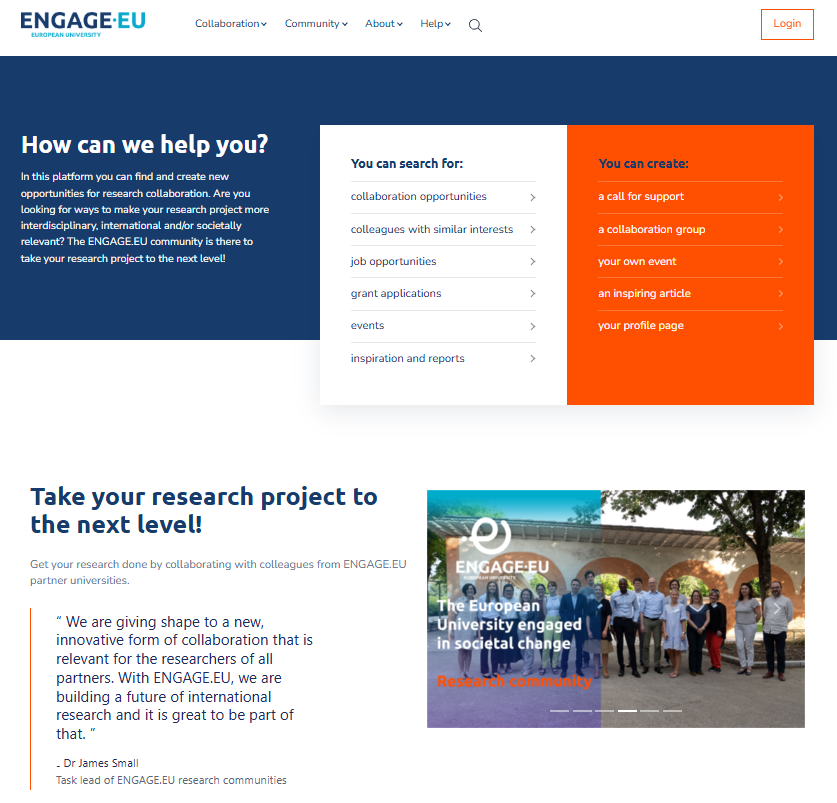Research Collaboration in an International Community

Rianne Strijker works at Tilburg University and one of her roles is to faciliate international research collaboration. She is the community manager within ENGAGE.EU, and has built and led research communities across universities, NGOs, and international networks. Rianne discussed the significance of research collaboration and the goals of the community for the European University Alliance. She shares what motivates researchers within ENGAGE.EU to collaborate, the barriers they face, and the approaches that help.
ENGAGE.EU is an alliance of 9 (soon to be 10) leading European universities in business, economics, and the social sciences, that closely collaborate in the fields of education and research.
It aims to provide European citizens with the set of skills and competences needed to tackle major societal challenges.
These existing and new challenges, such as digitalisation and artificial intelligence, climate change, ageing societies and migration, must be tackled successfully to ensure a sustainable and positive future. The alliance focuses on social sciences, humanities, economics, business administration, and law. The aim is to promote extensive collaboration between universities in Europe, with a focus on societal change.
Research collaboration in an international community
The community focusses on finding and creating new opportunities for research collaboration, and allows membership for researchers of the associated universities, although the community platform is open to anyone to read some information and get inspired.

Why research collaboration community is needed
Rianne highlighted the need for interdisciplinary research collaboration due to today's complex societal challenges, such as the Sustainable Development Goals (SDGs). These goals require collaboration between different disciplines and experts. However, current scientific systems make it difficult for researchers to collaborate in this manner.
Challenges for community collaboration
Researchers often work in isolation and must become experts in their field to build a successful academic career. This makes interdisciplinary collaboration challenging. Although funding is increasingly geared towards interdisciplinary collaboration, hiring procedures and publication requirements remain focused on expertise in a specific field.
Benefits
Despite the challenges, research collaboration offers benefits, such as bringing research back to a more creative process and making a societal impact. Young researchers often find this interesting as it provides practical opportunities and enhances their job market prospects.
Community strategies for research collaboration
ENGAGE.EU promotes collaboration by organising online and offline events, such as conferences, workshops, and research visits. They also offer seed funding to stimulate collaboration and build a network of ambassadors. The platform https://www.research-community-engage.eu/ plays a central role in facilitating collaboration.
The platform is user-oriented and offers opportunities for collaboration, finding colleagues, research teams, grant applications, events, and inspiring articles. Users can create content themselves and collaborate on research themes such as digital transformation. The platform is linked to email updates, keeping researchers informed of relevant collaboration opportunities.
While the platform is successful in facilitating collaboration, challenges remain, such as stimulating online interaction and attracting new researchers. The platform has 700 registered users, but active participation is lower. Managing the community is complicated by bureaucracy and administrative requirements.
Future strategies
Rianne is working on strategies to prove the community's value and make it self-sufficient in case the European grant ends. Possible strategies include attracting funding from universities, companies, and societal organisations.
Conclusion
The Community Leaders Forum 2025 highlighted the importance of research communities and the role of ENGAGE.EU in facilitating this collaboration. Despite the challenges, the platform offers researchers the opportunity to work together on societal changes and contribute to the Sustainable Development Goals.
Join us in the conversation!
Want to get involved in the conversation? Move over to our Slack group and find each other and more info there!
Not yet a member? You are welcome to join us.







